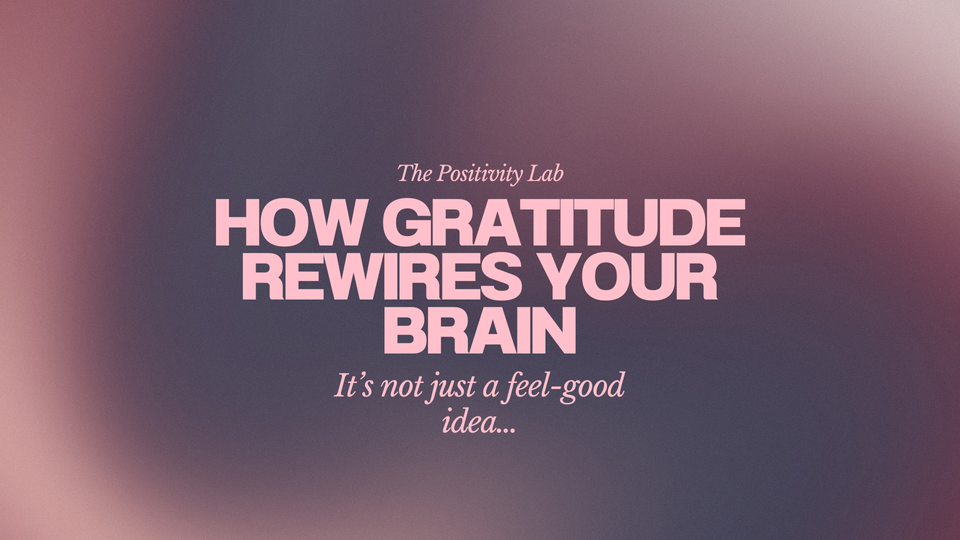The Positivity Lab: How Gratitude Rewires Your Brain

When life hits you hard, how you react can change everything. Positivity isn’t about ignoring reality—it’s about reshaping your mindset for resilience; it’s about using science to help you handle it better. Your brain has the power to adapt, and small, intentional changes can lead to huge benefits.
Here are some gentle yet effective strategies to help you cultivate gratitude in your daily life:
- Gratitude Journaling: Spend a few moments each day noting three things you’re thankful for. Research indicates this simple act can shift your focus from negativity to appreciation.
- Mindful Breathing: Take a minute to breathe deeply while reflecting on positive moments. This practice reduces stress hormones like cortisol and promotes relaxation.
- Positive Reflection: Regularly acknowledge small achievements. This helps train your brain to recognize and seek out positivity naturally.
Are you ready to enhance your well-being? Join my 10-day Positivity Challenge and discover how small daily practices can lead to profound changes in your life.
[Sign up for the 10-day Positivity Challenge]

In a world where it's all too easy to focus on what’s going wrong, practicing gratitude can make a remarkable difference in our mental and physical well-being. It's not just a feel-good idea—science shows that gratitude can actually rewire the brain to help you feel more positive and happy.
What is Gratitude?
At its core, gratitude is the act of acknowledging and appreciating the good things in your life, big or small. It’s more than saying “thank you.” It’s about genuinely recognizing the positive aspects around you, even during difficult times.
How Gratitude Affects the Brain
Research reveals that practicing gratitude regularly can have profound effects on the brain. Dr. Alex Korb, a neuroscientist at UCLA, explains that when we focus on what we are thankful for, our brains release two key chemicals that elevate our mood and improve overall well-being: dopamine and serotonin.
- Dopamine, often called the "reward chemical," is triggered when we engage in pleasurable activities. Gratitude naturally boosts dopamine, reinforcing feelings of satisfaction.
- Serotonin is known as the "feel-good hormone" and plays a crucial role in stabilizing our mood. When we practice gratitude, our brain produces more serotonin, which helps reduce anxiety and stress, fostering a more positive mindset.
The Positivity Loop: A Science-Based Habit
What’s incredible about gratitude is how it creates a positive feedback loop in the brain. The more you focus on gratitude, the more your brain seeks out and recognizes positive moments. Over time, this rewires your brain to default to a mindset of abundance rather than scarcity.
Practicing gratitude also strengthens the connection between the prefrontal cortex and other areas of the brain responsible for emotional regulation and decision-making. This means that over time, gratitude can actually change how you perceive challenges and opportunities, helping you to maintain a positive outlook even during tough times.

The Science-Backed Research Behind Gratitude
Research by Dr. Robert Emmons, a leading gratitude expert at UC Davis, found that people who actively practice gratitude feel 25% happier than those who don’t.
His studies show that regular gratitude practice can:
- Reduce levels of stress and anxiety
- Improve sleep quality
- Enhance physical health
- Strengthen relationships
In his study, Dr. Emmons asked participants to keep a gratitude journal for just three weeks. The results? They reported higher levels of optimism and overall satisfaction with their lives. Those practicing gratitude also had fewer physical complaints like headaches and fatigue, showing that gratitude benefits not just the mind but the body as well.
Practical Ways to Practice Gratitude
The best part about gratitude is that it’s a simple, accessible habit anyone can start right away.
Here are a few easy ways to integrate it into your life:
- Gratitude Journaling: At the end of each day, take a few minutes to write down three things you're thankful for. It could be as simple as having a warm meal or as meaningful as a supportive friend. This practice encourages your brain to focus on the positives and builds a habit of appreciation.
- Gratitude Letters: Write a letter to someone who has positively impacted your life. You don’t even have to send it! The act of writing helps deepen your appreciation and creates a sense of emotional connection.
- Mindful Gratitude: Take a few minutes to mentally acknowledge things you’re thankful for. Whether it's during your morning coffee or on your commute, being mindful of gratitude can shift your entire day’s perspective.
Health Benefits of Gratitude
Gratitude doesn’t just boost your mood—it has significant physical health benefits, too. According to research published in Personality and Individual Differences, people who regularly practice gratitude tend to have:
- Lower levels of inflammation
- Improved heart health
- Stronger immune systems
When you reduce stress and anxiety through gratitude, your body responds by boosting physical resilience. Practicing gratitude helps lower cortisol levels (a stress hormone), leading to better heart health and even increased longevity.

Why Gratitude is a Key to Positivity
Positivity doesn’t mean being happy every second of the day. Life brings both challenges and triumphs. However, gratitude helps you focus on the silver linings, even when things don’t go as planned. It teaches you to see challenges as opportunities for growth and resilience.
Being positive is about more than smiling—it’s about choosing to look for lessons in every situation. Gratitude acts as the foundation of this mindset, helping you remain grounded, open, and resilient no matter what life throws your way.
Ready to Transform Your Mindset?
If you’re ready to start your journey toward greater positivity and happiness, I invite you to join my 10-day Positivity Challenge. Every day, you’ll receive easy, science-backed habits designed to help you cultivate more gratitude and positivity in your life. Whether you’re looking to boost your mood, find more calm in your daily routine, or just feel better about the world around you, this challenge is for you.
[Sign up here to begin your journey toward a more positive, gratitude-filled life.]

Comments ()